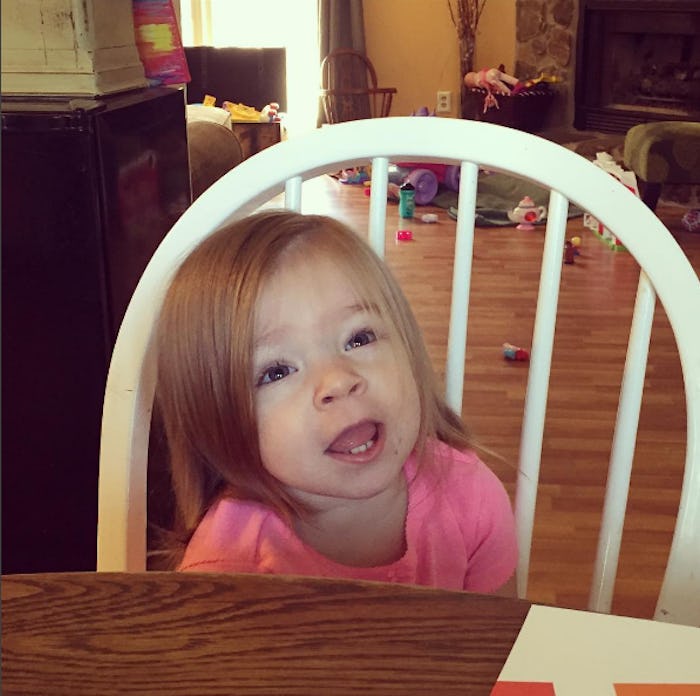I'm a big talker and will readily admit this to anyone. But I was not prepared for the conversations I have with my toddler. My daughter is also a huge talker and it blows my mind every day just how much she's learned and how she communicates with me. It's hard when your little one is a baby and they can't speak, but the signs your toddler is about to start speaking will change everything — it's like living with a talk show host whose only job is to keep you talking.
An important thing to remember about a toddler talking is that all kids are different. They all develop differently and they all reach milestones at varying times. According to a study in the journal Pediatrics, studies have also found that late-talkers (children at 2 years old who hadn't reached the language milestones they are "expected" to) did not have any increased risk of behavioral or emotional problems throughout their childhood and adolescence. In fact, they seemed to be just fine and had developed just as well as toddlers who were hitting all of the language milestones at the right time.
So if you see your toddler experiencing one of these seven signs, you might just have a little talker on your hands. (Or, they might keep you in that warm-up stage for months while they keep babbling.) There's nothing like a toddler telling you all about their day, but trust me when I tell you this — they only stop talking if there's food in their mouth or if they're asleep . . . and sometimes, not even then.
1They Can Cognitively Understand Some Words Or Phrases
Your baby won't speak unless they know what to say, so cognitive recognition of words and phrases is a huge sign, according to Parents. This means that your baby understands what you mean when you say, "Where's your ball?" or "Can Mommy see that toy?" If you ask them where the dog is and they know to point to your dog, this is another form of cognitive recognition.
2They Imitate Your Speech In Their Babble
Leaving pauses in conversation, using the same inflections as you, and babbling in response to your questions are all signs of your little one imitating your speech, even if their babbles don't make any sense. Baby Center noted that this happens right before a baby starts saying their actual first words, so be prepared for your little conversationalist to mimic your speech.
3They Babble & Point To Objects
As if they are identifying them. Parents noted that if this isn't happening by the time a baby is 14 months old, it might be worth talking to a pediatrician about speech delay. But this gesturing and babbling can signal that your little one is putting words and objects together, preparing to speak.
4They Listen To You
OK, toddlers aren't exactly known for their impeccable listening skills, but they can hear you, regardless of how you're ignored. According to Parents, listening to their parents speak is the best way for a child to learn how to talk and for their vocabulary. The more they listen and hear you talking, the more inclined they are to speak.
5They Begin To Use A Couple Of Words Meaningfully
Baby Center noted that right before your toddler officially starts speaking, they will begin to use one or two words more purposefully. For example, words like "ball" or "up" may be all your toddler says, but they are used to get their point across. They can point to a ball and say "ball" to mean they want to play with it. They may hand it to you and say "ball" asking you to play, too. "Up" can be a command to be held, to be put in the highchair, or to be carried. They no longer become babble words, but are actual parts of your child's vocabulary.
6They Babble More To You As A Conversation
Before, your child may have been babbling just randomly, but as they're gearing up to speak, you may notice that your toddler begins having actual "conversations" with you, all in their babble. Parenting noted that your baby's gibberish can sound like a conversation in another language — lots of inflection and hand gestures. Your toddler may look at you as they talk and wait for you to respond before they start up the gibberish again. You don't know what you've said or agreed to, but they do and that's all that counts.
7They Pay Attention To Their Books
And listen intently. Before, your toddler may not have been as interested in a story, but Parenting noted that books open up a world of possibilities for your little one's vocabulary. The more they "read" and hear (along with you pointing things out in a book), the more they recognize words and understand the language.
